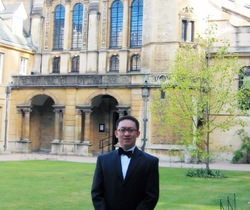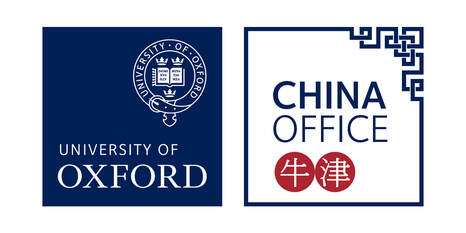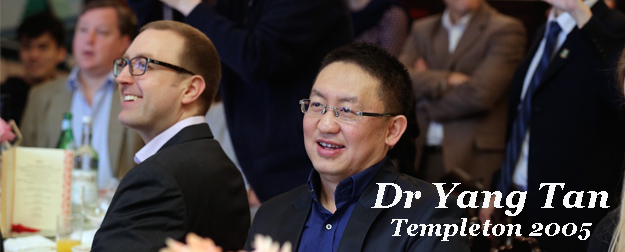Encounters with Alumni from Greater China
Dr Yang Tan studied for a DPhil in Management studies at Templeton College, Oxford. Based in Hong Kong, he is the Managing Director of CREAT Capital Company Ltd, part of an investment conglomerate in China with interests ranging from real estate to agriculture, mines to pharmaceuticals. He is also Assistant Secretary-General of the China International Chamber of Commerce for the Private Sector (CICCPS), a business association which aims to help Chinese private businesses expand overseas and compete in the global market, and whose 140 members include Lenovo, Geely Auto and Fosun.
What did you most enjoy about Oxford? How did it shape you as an individual?
The best thing was definitely meeting extraordinary people in Oxford, who were among the brightest that I had ever encountered. I spent three years at Oxford, and stayed in college in Egrove Park. Studying at Oxford and working with such wonderful colleagues expanded my horizons, and completely challenged me, making me think in a critical way and learn to look at things from all angles. David Feeney, Professor in Information Management and my supervisor, also had a huge impact on me. I learnt from him, among many other things, some vital soft skills. But the best part of my life at Oxford was definitely meeting my wife Cynthia, who was studying for an MSc in Management studies then.
Tell us about your career path since you graduated from Oxford.
My DPhil was in e-commerce and in how to sustain competitive advantage for SMEs in the UK, as prior to my studies at Oxford I was working in Siemens in Australia and New Zealand and was active in e-commerce and designing an integrated platform for the company. After Oxford, I became a management consultant for Monitor Group and Accenture in London for a few years, before moving to Hong Kong to work in a private equity fund jointly set up by Rothschild Investment Trust and CREAT Group. Currently I am the Managing Director at CREAT Capital Co. Ltd and look after the company’s overseas investments.
The best thing was definitely meeting extraordinary people in Oxford, who were among the brightest that I had ever encountered. I spent three years at Oxford, and stayed in college in Egrove Park. Studying at Oxford and working with such wonderful colleagues expanded my horizons, and completely challenged me, making me think in a critical way and learn to look at things from all angles. David Feeney, Professor in Information Management and my supervisor, also had a huge impact on me. I learnt from him, among many other things, some vital soft skills. But the best part of my life at Oxford was definitely meeting my wife Cynthia, who was studying for an MSc in Management studies then.
Tell us about your career path since you graduated from Oxford.
My DPhil was in e-commerce and in how to sustain competitive advantage for SMEs in the UK, as prior to my studies at Oxford I was working in Siemens in Australia and New Zealand and was active in e-commerce and designing an integrated platform for the company. After Oxford, I became a management consultant for Monitor Group and Accenture in London for a few years, before moving to Hong Kong to work in a private equity fund jointly set up by Rothschild Investment Trust and CREAT Group. Currently I am the Managing Director at CREAT Capital Co. Ltd and look after the company’s overseas investments.
 Dr Yang Tan at Keble College Oxford
Dr Yang Tan at Keble College Oxford
You are an active volunteer for the University in China and helped set up the new Oxford-CREAT Graduate Scholarships. How have you enjoyed your engagement with Oxford?
First of all, it has been a great learning process. While I was at Oxford I was involved in various student groups at the Said Business School. Now, as a volunteer for the university I get a unique opportunity to see inside Oxford as a whole, investigate how it works and learn about its strategy for China. It also allows me to meet the brightest minds from both Oxford and China. I particularly enjoy getting involved in the fundraising side. It was so rewarding for me to be involved in the setting up of the Oxford-CREAT Graduate Scholarships which will help talented Chinese students study at Oxford and receive the same opportunities as I did.
First of all, it has been a great learning process. While I was at Oxford I was involved in various student groups at the Said Business School. Now, as a volunteer for the university I get a unique opportunity to see inside Oxford as a whole, investigate how it works and learn about its strategy for China. It also allows me to meet the brightest minds from both Oxford and China. I particularly enjoy getting involved in the fundraising side. It was so rewarding for me to be involved in the setting up of the Oxford-CREAT Graduate Scholarships which will help talented Chinese students study at Oxford and receive the same opportunities as I did.
Why did CREAT Group choose to partner with Oxford on the scholarships?
CREAT chose Oxford because of its brand name and reputation, and also because they trust me, and I’m an Oxford alumnus! We really felt that Oxford was one of the best places to be educated. The objective in setting up the scholarships was to sponsor financially disadvantaged Chinese students so they could get the best possible education in the world and then to return to contribute to China, particularly to its economic development. China is a globalised economy now and in order to help it develop and integrate into the world stage, students will need international experience. This is something they cannot get from a university education in China alone.
What do you see as the future of China’s economy over the next few years?
I see China embracing slower economic growth, which is linked to its economic cycle. China's economic cycle is very much dictated by its investment cycle. In the present cycle, China's investment growth has far outpaced the growth of its GDP for the past 14 years in a row, compared with an average of 5 years in previous cycles. An investment correction is inevitable and we can expect to see deep economic changes sooner rather than later.
The challenges to China’s economy are like those anywhere else in the world: property downturn, the lowering of commodity pricing, the increase in labour costs. The demographic dividend will also peak in the next two years and then dissipate because of the aging population. I see a deadlock for the next six or seven years.
But with challenges come opportunities. The biggest one comes from the expansion of service consumption, in areas like education, health care, elderly care, telecommunications, e-commerce, mobile communication, tourism and the film industry. Long-term success in China’s economy will be linked to its structural reform for economic rebalancing. A balanced economy is really key to achieving sustained GDP growth.
Who do you most admire?
My mother, who taught me to be passionate, diligent, extremely focused and determined. She was supportive of my education at Oxford and was a very open-minded person.
What have been your proudest achievement and your most humbling moment?
My proudest achievement is of course my two lovely children. Alexander is turning five and Emma has just turned one. It is such a joy to watch them grow and learn.
My most humbling moment was the passing of my mother three years ago. It left a hole in my heart, and made me think how little time I spent with her. My priorities have shifted. To cherish my family and close friends now, and not to have regrets later on – that is important to me.
Interviewed in October 2014
CREAT chose Oxford because of its brand name and reputation, and also because they trust me, and I’m an Oxford alumnus! We really felt that Oxford was one of the best places to be educated. The objective in setting up the scholarships was to sponsor financially disadvantaged Chinese students so they could get the best possible education in the world and then to return to contribute to China, particularly to its economic development. China is a globalised economy now and in order to help it develop and integrate into the world stage, students will need international experience. This is something they cannot get from a university education in China alone.
What do you see as the future of China’s economy over the next few years?
I see China embracing slower economic growth, which is linked to its economic cycle. China's economic cycle is very much dictated by its investment cycle. In the present cycle, China's investment growth has far outpaced the growth of its GDP for the past 14 years in a row, compared with an average of 5 years in previous cycles. An investment correction is inevitable and we can expect to see deep economic changes sooner rather than later.
The challenges to China’s economy are like those anywhere else in the world: property downturn, the lowering of commodity pricing, the increase in labour costs. The demographic dividend will also peak in the next two years and then dissipate because of the aging population. I see a deadlock for the next six or seven years.
But with challenges come opportunities. The biggest one comes from the expansion of service consumption, in areas like education, health care, elderly care, telecommunications, e-commerce, mobile communication, tourism and the film industry. Long-term success in China’s economy will be linked to its structural reform for economic rebalancing. A balanced economy is really key to achieving sustained GDP growth.
Who do you most admire?
My mother, who taught me to be passionate, diligent, extremely focused and determined. She was supportive of my education at Oxford and was a very open-minded person.
What have been your proudest achievement and your most humbling moment?
My proudest achievement is of course my two lovely children. Alexander is turning five and Emma has just turned one. It is such a joy to watch them grow and learn.
My most humbling moment was the passing of my mother three years ago. It left a hole in my heart, and made me think how little time I spent with her. My priorities have shifted. To cherish my family and close friends now, and not to have regrets later on – that is important to me.
Interviewed in October 2014

